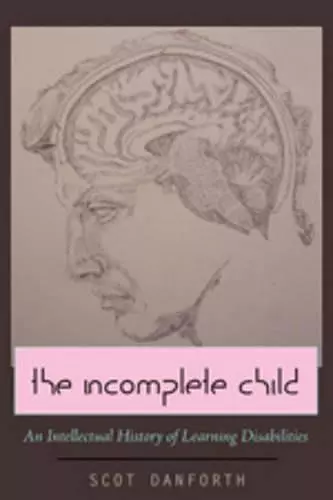The Incomplete Child
An Intellectual History of Learning Disabilities
Format:Paperback
Publisher:Peter Lang Publishing Inc
Published:6th Mar '09
Currently unavailable, and unfortunately no date known when it will be back
This paperback is available in another edition too:
- Hardback£95.25(9781433101717)

With the passage of Public Law 94-142 in 1975, the learning disability construct gained national legitimacy. Feeding that political achievement, behind the very idea of a learning disability, was the development of a science that blended neurology, psychology, and education. This book tracks the historical creation of the science of learning disabilities, beginning with the clinical research with brain-injured World War I soldiers conducted by German physician Kurt Goldstein. It traces the growth of the two primary research traditions, the psycholinguistic theory of Samuel Kirk and the movement education of Newell Kephart, exploring how specific scientific orientations, theories, and practices led to the birth of the learning disability in the United States.
«In ‘The Incomplete Child’, Scot Danforth explores the historical roots of the psychological theories that have, since early in the twentieth century, undergirded what has become the field of learning disabilities. It is an intellectual history that points to the conflicts and contentious debates between proponents of a clinical viewpoint of this disability on the one hand and those subscribing to a psychometric and positivistic interpretative framework on the other. Danforth’s great achievement in this conceptually rich and provocative volume is to alert us to the dangers inherent in an uncritical faith in the psychological sciences in explaining and ultimately trying to control human diversity. It is a must-read for anyone interested in the domain of childhood learning problems and the questionable legacy of special educators in addressing them.» (Barry M. Franklin, Author of ‘From ‘Backwardness’ to ‘At-risk’: Childhood Learning Difficulties and the Contradictions of School Reform’; Professor of Education, Utah State University)
«That some people fail to learn easily or predictably has troubled academic sorts at least since the early 1900s. Neither ‘mentally ill’ nor ‘mentally retarded’, these people created a problem that, as Scot Danforth shows in ‘The Incomplete Child’, became a twentieth-century system of meaning and treatment for this particular failure. In the history of ideas tradition, Danforth’s book follows the evolution of learning disability from its German origins to its North American controversies. In doing so, it also traces the history of what Danforth calls ‘an actuarial objectivism’ in tension with ‘a clinical subjectivism’ in this interdisciplinary field. Breaking new ground, the book is a must read for academics and lay readers alike.» (James W. Trent, Author of ‘Inventing the Feeble Mind: A History of Mental Retardation in the United States’; Professor of Social Work, Gordon College)
«In ‘The Incomplete Child’, Scot Danforth explores the historical roots of the psychological theories that have, since early in the twentieth century, undergirded what has become the field of learning disabilities. It is an intellectual history that points to the conflicts and contentious debates between proponents of a clinical viewpoint of this disability on the one hand and those subscribing to a psychometric and positivistic interpretative framework on the other. Danforth’s great achievement in this conceptually rich and provocative volume is to alert us to the dangers inherent in an uncritical faith in the psychological sciences in explaining and ultimately trying to control human diversity. It is a must-read for anyone interested in the domain of childhood learning problems and the questionable legacy of special educators in addressing them.» (Barry M. Franklin, Author of ‘From ‘Backwardness’ to ‘At-risk’: Childhood Learning Difficulties and the Contradictions of School Reform’; Professor of Education, Utah State University)
«That some people fail to learn easily or predictably has troubled academic sorts at least since the early 1900s. Neither ‘mentally ill’ nor ‘mentally retarded’, these people created a problem that, as Scot Danforth shows in ‘The Incomplete Child’, became a twentieth-century system of meaning and treatment for this particular failure. In the history of ideas tradition, Danforth’s book follows the evolution of learning disability from its German origins to its North American controversies. In doing so, it also traces the history of what Danforth calls ‘an actuarial objectivism’ in tension with ‘a clinical subjectivism’ in this interdisciplinary field. Breaking new ground, the book is a must read for academics and lay readers alike.» (James W. Trent, Author of ‘Inventing the Feeble Mind: A History of Mental Retardation in the United States’; Professor of Social Work, Gordon College)
ISBN: 9781433101700
Dimensions: unknown
Weight: 440g
301 pages
New edition